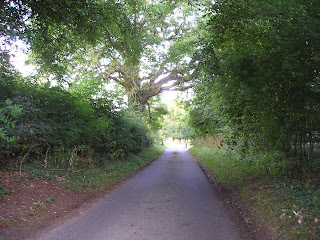Babies Everywhere
Everywhere I look at the moment there are babies - it's that time of year. I'm not talking human babies although quite a lot of my friends seem to be having new grandchildren, yet another sign of our ageing. In the secret valley animals outnumber humans by dozens to one so it isn't surprising that all around us there are signs of new life.
Lambing starts later here than in many places, for the spring grass is also later, so it is with impatience that we wait to see them skipping in the fields and chasing one another up and down the river banks. Of course, that was some weeks ago - now they are grown quite large and, as I write this, very noisy as they call for their mothers who have been separated for shearing. It will be a few hours before they have all found one another and normality returns again; the sound of contented and playful bleating telling us that all is well.
Calves can be born in spring or autumn. Beyond the secret valley is a beautiful herd of Red Devon cattle and they make good mothers. I first came across this gentle breed when I worked on a farm as a teenager on Exmoor and they have been a firm favourite ever since. Bred for beef, we used to hand milk a few for the farm's own use and the milk was very rich and creamy. Large enamel basins of it would be placed on top of the Rayburn stove (fired by the peat turves I have recently written about, click here) and I would watch fascinated as the cream would rise in large clots to be skimmed off to be eaten with afternoon tea, that most traditional of West Country meals.
The bantams - Lavender Pekins (Cochins) - are all rapidly going broody. I find that they are only good layers in spring, the rest of the year they lay fewer eggs. We always set some of these under them so that we have a new supply of youngsters: if we get too many there is always a ready home for them but mostly they are there as ready-made meals for Mr Fox who is a far too regular visitor. I'd rather see the bantams having a short but very lovely time wandering about the place than cooped up in a pen somewhere. When left to free range it is amazing just how far they travel up and down the field which does make them rather vulnerable. As the fox usually visits in the early hours of the morning I try to always remember to shut them away safely for the night. In the cold weather earlier in the year a fox visited the garden regularly during the day - at one time actually peering through the glass garden door at us.

We don't keep duck but that doesn't stop us from seeing them in the garden. Usually one raises a brood of ducklings somewhere secluded: often under a large clump of oat grass or, before it rotted away completely, a few feet up on top of a rotten tree stump at the foot of a hedge. As soon as they hatch, she leads them away down the field to the river below the house.
Every year, there are many pheasants that survive the shooting season. Last spring we had one nest in a planting trough beside our kitchen door. Despite the constant activity, she sat tight and none of the dogs, visiting or resident, discovered her. I have read that, when sitting on eggs, the hen pheasant can supress any scent so as to avoid predators. No sooner had the chicks hatched than every dog in the neighbourhood was investigating the planter but by then, of course, she had led them all to safety.
Partridge also visit the garden but are much more wary. When their eggs hatch the chicks are not much bigger than bumble bees and swarm about their mother. They are so tiny they appear to have no legs moving as if somehow they are fitted with wheels instead!
I almost certainly won't find it necessary to blog about the next 'hatching' for an eagerly waited event is the royal birth. When Kate has her baby it will make world news - you won't need to see a photo of it here!








Living the dream. Sigh.......
ReplyDeleteI'm very lucky, Lynda!
ReplyDeleteJohnson
Wonderful having animals around, isn't it Johnson? Had a muntjac in the garden in very early spring! I took the requisite pic and then chased it out but it had already eaten the bluebell leaves!
ReplyDeleteI never tire of seeing the wildlife - or the farm animals - around the place; one of the joys of living in the depths of the country.
ReplyDeleteI agree 'though that they are better kept out of the garden. The sheep have munched some pots waiting to be planted. I left them just a little too close to the fence!
Johnson